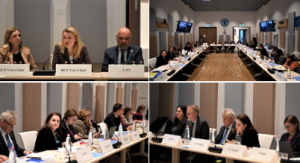Global goals – just like regional and national goals — can only be achieved if we work together. This is a reason that revitalizing partnerships is at the heart of the Sustainable Development Goals (SDGs).
With this in mind, under the umbrella of the Regional Collaborative Platform, regional representatives of 20 United Nations agencies convened on 6–7 November in Budapest to discuss the pressing issues of Europe and Central Asia, as well as to strengthen their partnership for a better future in the region.
The meeting was hosted by the Food and Agriculture Organization of the United Nations (FAO), and co-chaired by two Vice-Chairs, the Executive Secretary of the Economic Commission for Europe (UNECE) and the Regional Director of the United Nations Development Programme (UNDP).
Subjects covered at the meeting included political and human rights trends in the region, assistance to UN country teams, accelerating regional support to achieve the SDGs, climate action, the Regional Forum on Sustainable Development, review of the Global Compact for Safe, Orderly, and Regular Migration, and others.
The Regional Collaborative Platform for Europe and Central Asia unites all UN entities working on sustainable development in the region to ensure full collaboration and coordination in addressing key challenges that transcend country borders. The platform provides policy support and access to expertise at the service of the specific needs and priorities of the Europe and Central Asia region and in support of the UN country teams at the country level.
“UN collaboration in the region is essential to respond to crises together and to accelerate SDG progress in countries and at the local level”, said Tatiana Molcean, UNECE Executive Secretary and RCP Co-Vice-Chair. “But we also need to promote instruments that prevent future conflicts, such as cooperation on transboundary water, urban development and energy”.
There are multiple challenges in the region of Europe and Central Asia for which effective mitigation requires a closer cooperation among UN entities. The increasing instability due to the war in Ukraine and other conflicts, the negative impact of climate change and natural disasters, and human rights issues are all calling for United Nations agencies to better coordinate their work, as well as their support to the UN country teams at national levels.
Multi-partner coalitions within the UN system play a key role in responding to cross-cutting challenges in the region and helping realize synergies among related areas of work of different United Nations entities.
This is the core idea of the establishment of the Issue-based Coalitions (IBCs) – regional UN task forces coordinating cross-sectoral activities and developing plans for joint action, facilitating improved cooperation between different UN agencies, and with their partners. In Europe and Central Asia, these coalitions are specialized in topics such as health and well-being, gender equality, adolescents and youth, social protection, large movements of people, displacement and resilience, environment and climate change, sustainable food systems, as well as in digital transformation. The work of the IBCs is guided by the Regional Collaborative Platform; therefore, the work of the regional Issue-Based Coalitions was also discussed at the meeting.


